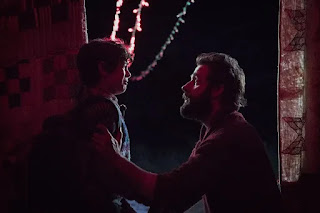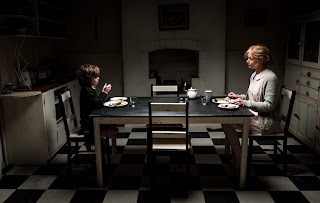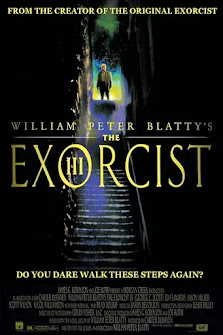As usual, we interspersed our marathon of death with lighter, family friendly fare, which we watched with our younger siblings.
A Haunting in Venice (2023)
We went to see this one in theaters. I missed Branagh's Death on the Nile (which was reportedly a misfire) but this one, like the director's Murder on the Orient Express is a respectable enough adaptation. Like the earlier film it features a strong supporting cast and Branagh's interpretation of Agatha Christie's famous sleuth, if a little unorthodox, is nonetheless enjoyable. What's more, even though his Poirot is anachronistically agnostic, at the film itself leaves open the possibility of genuine supernatural realities.
7.8/10
A Quiet Place (2018)
Though it has its flaws, Jonathan Krasinski's 2018 horror/thriller still holds up. Its portrayal of a beleaguered but intact family unit stands out in a Hollywood dominated by cynicism and empty woke ideology and the sacrificial actions of Krasinski's character are a far more moving and authentic example of heroism then anything the industry's seemingly endless superhero spectacles have to offer. It also remains a genuinely suspenseful, and relatively restrained, exercise in survival horror.
8.8/10
We also found time to re-watch a few of old favorties (without the younger siblings naturally):
The Blair Witch Project (1999)Since its initial release, The Blair Witch Project has become a rather polarizing film. Some dismiss it as a poorly made, gimmicky film (to be sure it did spawn a host of mediocre imitators), while others continue to laud it as a bold and well-crafted piece of folk-horror. Having seen it twice now, long after the hype has died down, I find myself firmly in the second camp. If you allow yourself to get swept up in the film's narrative, it's an incredibly effective horror film. The sense of dread mounts as the film progresses and the three main characters become more and more disoriented, their own fears (both outward and existential) rising at times to a sense of hysteria. Yet, it's an incredibly subtle film, with the horror always more suggested then actually glimpsed, demonstrating the fact that what we fear the most is the unknown. In doing so, The Blair Witch Project evokes what Ann Radcliffe called "terror", which "expands the soul and awakens the faculties to a high degree of life".
9/10
The Old Dark House (1932)Since we were watched Hammer Studio's ill-conceived comedic remake, we decided to revisit the original. James Whale's magnificent direction is complemented by Arthur Edeson's moody and, at times, expressionistic cinematography. The witty script, adapted from a 1928 novel by J. B. Priestley, is ably abbeted by the films stellar cast and the characters are surprisingly nuanced for a film of this kind. It's not exactly deep in terms of theme but it's a wildly entertaining little film nonetheless.
8.8/10
Halloween (1978)
As usual, we closed off the year by watching Carpenter's classic, a film which, despite its simplicity, never gets old and whose reputation can never be tarnished, regardless of how many inferior sequels, remakes and reboots are attempted. More detailed thoughts can be found in my full review.
8.8/10
Shocktober 2023 Ranked
Though I reviewed quite a few films this October from other genres, I'm only ranking the genuine horror movies.
1. Halloween (1978)
45 years after its release, Carpenter's classic stands head and shoulders above the countless sequels, remakes, reboots and rip-offs it inspired.
2. The Sixth Sense (1999)
Equal parts drama and horror, The Sixth Sense may be the best film ever made on the subject of the supernatural.
3. The Exorcist (1973)
Is The Exorcist the scariest movie of all time? Depends on who you ask but it remains, despite its flaws, one of the best directed horror films ever made and a powerful testament to the existence of the demonic.
4. A Quiet Place (2018)
Though it's not a great work of art, John Krasinski's restrained and surprisingly wholesome thriller is a welcome relief from the excessive bombast which dominates horror films today and from the general nihilism of Hollywood in general.
5. The Blair Witch Project (1999)
No film gets under my skin quite the way Blair Witch does yet its appeal (perhaps that's the wrong word) cannot really be explained. One must experience the film for themself.
6. The Old Dark House (1932)
Quite simply, one of the most entertaining horror movies ever made and possibly the best "haunted house" film (though the film only loosely fits that description) ever made.
7. Signs (2002)
Though it suffers from a hackneyed ending, Signs is still one of M. Night Shyamalan's best pictures and plays perfectly to his strengths as a director.
8. The Silence of the Lambs (1991)
Magnificent performances and a great script elevate this serial killer film which explores the evil of psychotic killers but can't quite help make them an object of morbid fascination.
9. Psycho (1960)
Another masterpiece from the master of suspense, Psycho is also elevated by Anthony Perkin's iconic performance.
10. The Happening (2008)
An admittedly flawed throwback to corny old disaster movies, The Happening is underrated.
11. Dog Soldiers (2002)
A suspenseful, character driven little b-movie, Dog Soldiers is well worth watching for fans of werewolf pictures.
12. The Village (2004)
Amazing cinematography and solid performances recue an intriguing but a rather on-the-nose script.
13. The Mummy (1999)
A fun throwback to old adventure serials. Brendan Fraser is great in his star-making lead role.
14. The Babadook (2014)
Though the allegory is a bit on-the-nose at times, Jennifer Kent's debut remains a stirring horror film.
15. Arachnophobia (1990)
A fun 90's monster movie. John Goodman steals the show.
16. Psycho IV (1990)
The best of the unnecessary sequels to Hitchcock's classic, this prequel is better than it had any right to be.
17. Jacob's Ladder (1990)
An intriguing but messy film, I may need to spend more time with Jacob's Ladder before I can develop a strong opinion on it.
18. Phantom of the Opera (1962)
Though not much of a horror movie, the Hammer version of Phantom is a pretty decent costume drama.
19. Phantom of the Opera (1925)
Lon Chaney's performance holds together this rather unfocused adaptation of Gaston Leroux's novel.
20. These Are the Damned (1963)
A chilling cautionary tale, even if its poorly plotted at times.
21. A Haunting in Venice (2023)
Though not as good as Branagh's first Agatha Christie adaptation, A Haunting in Venice is still an entertaining little mystery thriller.
22. Friday the 13th (1980)
As silly and, at times, inept as it is, the original Friday still makes for some fun seasonal viewing if you go in with the right expectations.
23. The Exorcist III (1990)
Though completely unnecessary (and theologically suspect) the second sequel to William Friedkin's masterpiece mostly holds up thanks to solid performances and a surprisingly verbose script.
24. The Cabin in the Woods (2012)
Though it contains some interesting meta-commentary on the genre, The Cabin in the Woods ultimately lacks the substance that would bring me back for more.
25. Halloween (2018)
Though it's one of the better Halloween sequels (for whatever that's worth) David Gordon Green's reboot is too derivative to make much of an impact.
26. Halloween Ends (2022)
The most daring of Green's reboot trilogy, Halloween Ends is hampered by the need to create a satisfying conclusion to the series.
27. Psycho II (1983)
This completely unnecessary sequel, though bolstered by a committed performance from Perkins, is too contrived to really work.
28. Halloween Kills (2021)
Though perhaps worth a watch for its occasional moments of unintentional hilarity, Halloween Kills is so tone deaf, so unfocused, and so lazily written that it's in the running for the worst of the series (and that's saying something).
29. The Old Dark House (1963)
Lame.
30. Psycho III (1986)
Though not as contrived its predecessor, Psycho III represents the series at its most sadistic and exploitive.
That's all folks!

















































